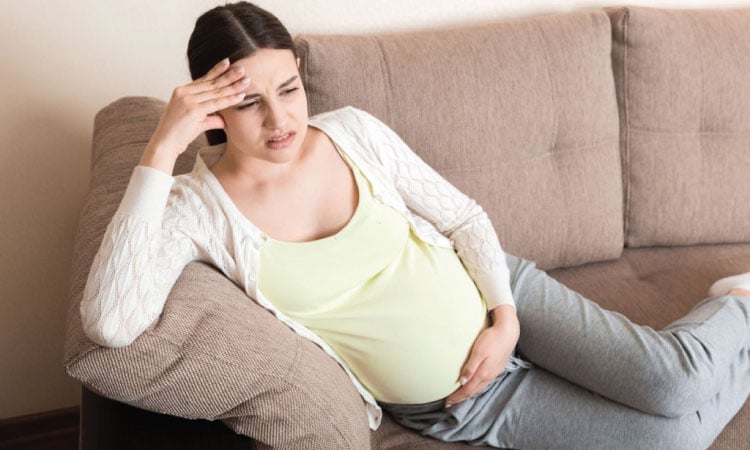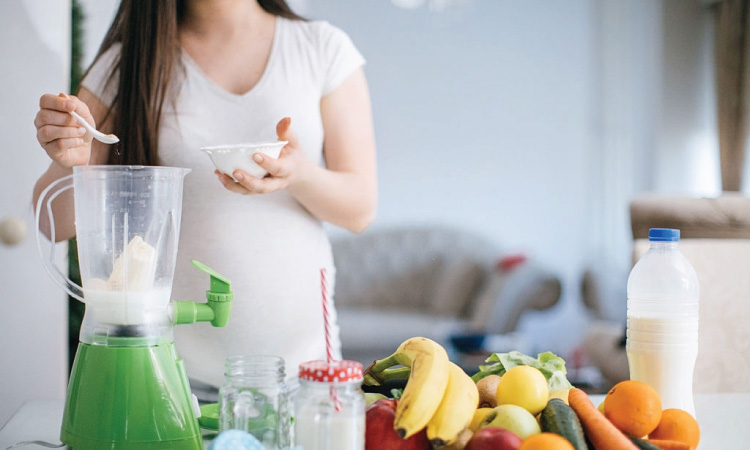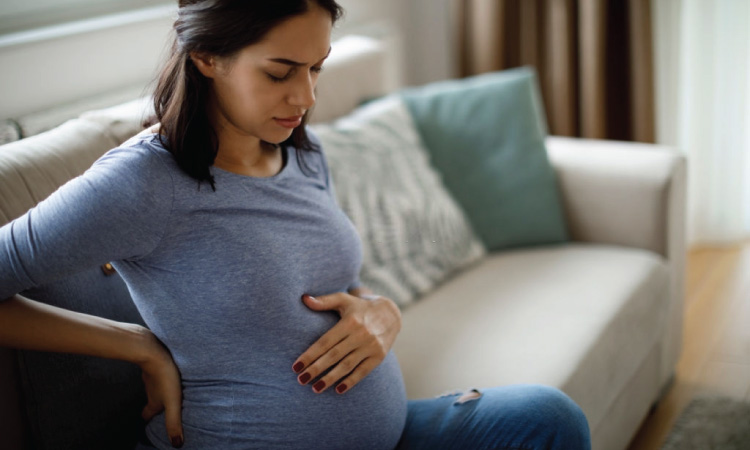It is absolutely normal to feel tired, or even exhausted, during pregnancy, especially during the initial weeks and then in late pregnancy months. Even though feeling tired causes no harm to the developing fetus, extreme tiredness in early pregnancy can take a toll on a pregnant woman’s daily activities.
What Does Pregnancy Fatigue Feel Like?
Fatigue is one of the first noticeable signs of pregnancy. While sharing their experience, many expecting mothers said that they notice this fatigue even as early as one week after conception. They feel a continuous lack of energy. Even a good night’s sleep, waking up feels like a task. The day is marked with lethargy.
Since pregnancy fatigue strikes very early, it is also one of the prime early signs of pregnancy.
You may constantly feel like going back to your nice warm bed, and you may be sluggish throughout the day. You may not be able to muster the will to do the simplest task, and even the smallest activity or household task might seem to drag on. Even your most favourite hobbies and picnic spots seem to lose their romance.
Well, welcome to the roller coaster ride called pregnancy.
Our panel gynaecologist Dr Ankita Patel Tayal says that for most people, the extreme fatigue of the first trimester is soon forgotten. That’s because the second trimester often comes with a glow and a boost in energy. So don’t worry if it seems like all you’re doing these first few weeks is lying around, dozing, or napping. This is normal. Fatigue often returns in the third trimester. This is because of disrupted sleep and increasing discomforts. But this will also get better over time.
What Causes Extreme Tiredness In Early Pregnancy?
General weakness during the first trimester of pregnancy can be due to a number of factors. During this period, the body is trying its best to get accustomed to the storm of pregnancy hormones. Metabolism also noticeably increases during this time. This means more energy is burned.
Several physical, emotional, and hormonal changes during this pregnancy phase contribute to lowering the energy levels, making the first trimester hard. General muscle weakness during pregnancy can also contribute to extreme tiredness in early pregnancy. Following are some factors that contribute to extreme tiredness in pregnancy:
Calculate Due Date With LMP
- Placenta formation: Throughout the early pregnancy stage, the body is working overtime, creating a vital organ that supplies nutrients and oxygen for the baby – placenta. This is a colossal task that saps every drop of energy
- Increased blood volume: The blood volume starts to increase from early pregnancy itself. This demand for creating and pumping extra blood to the developing fetus can trigger weakness during pregnancy first trimester
- Mood upheaval: As already mentioned, the surge of pregnancy hormones is the primary reason for the extreme tiredness during early pregnancy. Emotional upheaval brought by hormonal changes can cause extreme tiredness
- Other physical changes: The production of milk glands are also under progress. The heart rate increases for pumping extra blood. Low pressure, low sugar, and anaemia can also contribute to extreme tiredness in early pregnancy
- Morning sickness: Nausea and vomiting during the initial weeks of the pregnancy also contribute to draining out of energy. The hormone progesterone’s increased production can also make you sleepy and urges you to remain in bed
- Lifestyle factors: More often, some lifestyle factors contribute to extreme tiredness during early pregnancy. If the mother already has a child to look after or some unavoidable duties to perform, she will not be able to take enough rest and will be continuously exhausted. This can cause or aggravate tiredness during early pregnancy
How Long Does Tiredness Last In Early Pregnancy?

Even though fatigue during pregnancy seems never-ending and unrelenting, this tiredness and fatigue usually subside by the end of the first trimester. By ten to twelve weeks of pregnancy, the body gets accustomed to all the metabolic, physical, and hormonal changes.
More often, expecting women enter their second trimester with renewed energy levels. However, after this energized “honeymoon phase of pregnancy”, the fatigue returns with a bang in the third trimester.
Related Reading: Household Work During Pregnancy – What Do And What To Avoid
How Do You Beat First Trimester Fatigue?
So pregnancy fatigue is normal and the body has its reasons to feel tired and exhausted. Add nausea to the equation and it is a perfect recipe for someone to just want to lay in bed undisturbed. However, you will need to perform your duties and for that you will need to figure ways to beat this early pregnancy fatigue.
“How to feel energized during early pregnancy” is a doubt raised in many pregnancy forums. Here are some tips to beat extreme tiredness during early pregnancy:
1. Relaxing during early pregnancy can ward off pregnancy fatigue
Practising yoga and meditation is very beneficial to combat fatigue during early pregnancy. Breathing exercises and simple stretches help to alleviate stress. Likewise, listen to music or read books with positive messages.
According to a study, practising yoga regularly increase sleep quality and decreases extreme tiredness even among cancer survivors. This show how powerful is yoga to fight off fatigue. It is equally important to avoid worrying or tension causing unnecessary thoughts.
2. Maintain sleep routine
Maintaining a sleep routine and ensuring adequate sleep is very important for combating fatigue during pregnancy. For this, establish a sleep routine and try to follow it without fail.
Try to get to bed at the same time every night. Taking a warm bath before going bed or getting a leg or back massage will help you to wind down and get a night of uninterrupted sleep. Likewise, avoid screen time from at least one hour prior to bedtime.
If you are not getting enough sleep during the night, taking short naps during the day whenever you feel tired also helps. It is important to take the body’s cues.
However, never nap for too long or close to your bedtime. Both these adversely affect sleep during the night. Around 8 hours of uninterrupted sleep is necessary to fight off fatigue during pregnancy.
3. Try to stay physically active
Regular exercise will help to improve sleep quality and thereby make you feel less tired. Exercising during pregnancy can make you feel re-energized and improve your appetite.
If you are not physically active before pregnancy, get into small exercises like 20-minute-walking. You can slowly increase the time.
Related Reading: 8 Workouts To Avoid During Pregnancy
4. Eat a well-balanced diet during pregnancy
Following a healthy and balanced diet alone helps to boost energy levels. Even though the vomiting and nausea take a toll on your food intake, focus on eating a small nutritious meal in small intervals. This will help to maintain the energy level throughout the day.
Include iron-rich food items in your daily menu. Many a time, extreme tiredness in early pregnancy can be due to anaemia. Likewise, focus on protein-rich food also during this time to boost energy levels. Try eating different varieties of fruits whenever you feel low. Fruits help to spike out the blood sugar, thereby pushing up the energy levels.
5. Limit caffeine intake
If you are like me, you’d consider gulping down cups of tea or coffee and think they will give you energy. But when pregnant, caffeine is best limited. Excessive caffeine intake is not good during pregnancy.
Studies have it that one should limit caffeine intake to 200 mg per day during pregnancy. However, if you find it hard to get quality sleep, it is better to limit the caffeine intake further.
6. Stay hydrated
Dehydration drains energy. Fatigue is one of the ways of the body signalling the fluid level is falling low. Normally 6 to 8 glass of water is needed for the body to stay well hydrated.
However, during pregnancy, the intake should be increased as the demand also increases. The body needs more water to produce amniotic fluid and extra blood. So drink plenty of water to combat extreme tiredness din early pregnancy.
However, cut the intake of water towards bedtime. Otherwise, frequent loo visits during the night hamper sleep and contribute to extreme tiredness the following day.
Related Reading: How To Stay Hydrated During Pregnancy?
7. Seek help
In case of extreme tiredness during early pregnancy, seek help from your dear and near one in completing your daily tasks. Your spouse, older children, parents, sisters, in-laws, and friends can take some errands from your shoulder.
What can I take for energy while pregnant?

“What can I take for energy while pregnant”is a question asked by many new mothers. Never turn to sugary foods or energy drinks to fix this issue. It will trigger many other health issues that adversely affect the healthy progression of pregnancy.
Consuming foods loaded with iron, protein and fibre are great ways to boost energy while pregnant. Therefore, including the following five foods in your early pregnancy diet will help to cope with extreme tiredness in early pregnancy.
1. Oatmeal
Oats are loaded with iron and zinc. Studies show that these two elements are vital to fighting off fatigue. In addition, oatmeal is rich in B vitamins. Vitamin B is an excellent energy booster. Being rich in iron, oatmeal helps to combat fatigue due to anaemia. Oatmeal is also rich in soluble fibre. This slow-burning carbohydrate is vital for keeping up the energy level.
2. Fresh banana/ banana shake
Bananas are well known for being rich sources of potassium. They are also rich in other nutrients, such as protein and vitamin B. This means that having bananas is a great way to boost your energy, making it a dream come true for mothers-to-be everywhere.
You can have it fresh or in the form of a milkshake. If you want to add that little bit of extra flavour, you can also eat it with honey.
3. Apples
They don’t say “an apple a day keeps the doctor away” for no reason. Apples are very healthy, pregnant or not. Along with various vitamins, they are also laden with nutrients like boron, a natural energy booster. Apples during pregnancy are great to combat not just fatigue, but even other related issues.
They also boost the natural sugars in your body, like glucose, without spiking your blood sugar. So they are a quick and natural energy booster.
4. Almonds
Almonds are one of the healthiest foods ever, full of protein, fibre and magnesium. Magnesium is essential for the conversion of sugar into energy. Hence, eating almonds during pregnancy will help boost your energy. They are also not very heavy and can be eaten as a light snack.
Plus you can soak them overnight and get many health benefits by eating them after peeling off the skin the next morning.
5. Pumpkin seeds
Just a single serving of pumpkin seeds provide you with more than a quarter of the needed daily amount of magnesium. So, eating pumpkin seeds can speed up the conversion of food into energy, making it a safe, natural energy booster.
Is Extreme Fatigue Normal In Early Pregnancy?

If you feel tired and fatigued during the first few months of pregnancy and are worried about it, you can put your mind at rest. Fatigue is very common for pregnant women. It is one of the earliest symptoms of pregnancy.
It is also very common in the third trimester. More than half of all pregnant women suffer from fatigue during the last few months of pregnancy. So if you feel tired, it is probably not anything to worry about.
Related Reading: 12 Early Pregnancy Tips To Avoid Miscarriage
However, you should learn to differentiate the “normal” fatigue from the type that has the potential to be dangerous. For example, a sudden, unforeseen increase in fatigue is not normal.
If you feel like you suffer from abnormal fatigue, you should consult a doctor immediately. It could be a sign of an underlying health condition, like anaemia or even gestational diabetes.
Dr Ankita Patel Tayal, MD obgyn, a practising obstetrician since more than 10 years, also wants to clear a myth related to fatigue in pregnancy. She says that some people believe that a pregnant lady will feel more tired during the pregnancy if they are carrying a boy. However, there is no research to support this. Fatigue is a common symptom of pregnancy and has nothing to do with the sex of your baby. Hormone changes play a big role in why you might be feeling more tired than usual — you’re growing a human inside you!
Conclusion
It is perfectly normal for you, as a newly pregnant woman, to experience fatigue. It is important to accept this message your body is trying to send you and get some rest. Your body needs more energy and more rest during this time.
So, just relax, take a nap when you feel like it, eat healthily, and drink lots of water!


